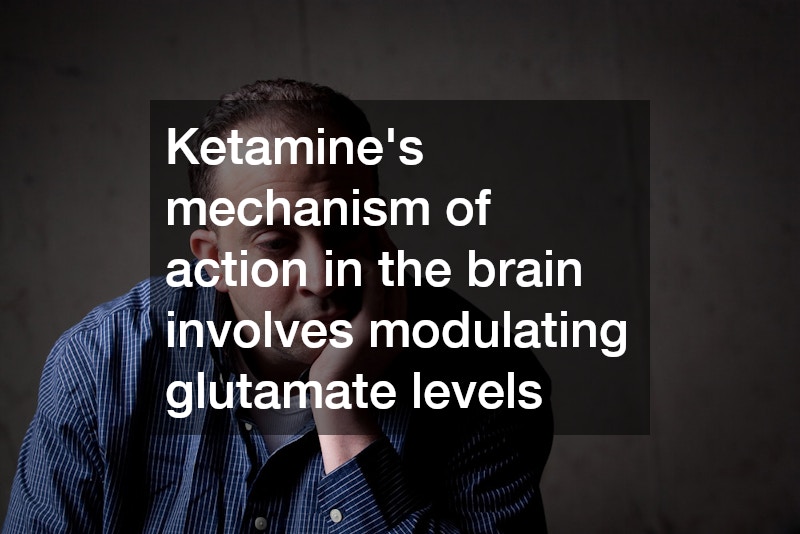Ketamine, a drug with a long history in anesthetic practices, has emerged as a promising treatment for various psychological conditions. In this article, we explore the benefits that undergoing ketamine treatment can offer for those dealing with mental health issues. As research continues to shed light on its potential, ketamine is gaining recognition as an important alternative for those unable to find relief with traditional treatments.
Overview of Ketamine Treatment
Ketamine treatment involves using a medication originally developed as an anesthetic, now repurposed to help manage mental health conditions like depression. The history of ketamine dates back to its approval in the 1970s as a safe anesthetic, widely used for surgical procedures due to its dissociative effects and rapid action.
Researchers have discovered that ketamine’s mechanism of action in the brain involves modulating glutamate levels, helping to quickly lift depressive symptoms.
In recent years, ketamine has garnered attention for its potential to rapidly alleviate symptoms in patients with treatment-resistant depression. Although it does not have full approval as an antidepressant from global regulatory bodies, ketamine is used off-label in many countries to provide relief for patients with few other options. This promising therapeutic avenue has led to an increase in clinical trials examining its effects and safety, broadening our understanding of its utility in mental health care.
As ketamine treatment becomes more widely available, it offers an alternative for patients who have not responded to standard medications such as SSRIs. This alternative approach is particularly beneficial in urgent cases where traditional therapies are ineffective or too slow-acting. Clinics offering ketamine therapy are expanding, making it more accessible to a broader range of patients seeking novel approaches to mental health treatment.

Clinical Studies and Outcomes
The effectiveness of local ketamine treatment for depression has been a focal point of multiple clinical studies over the past decade. In various controlled trials, patients receiving ketamine have shown remarkable improvements in mood and reductions in depression symptoms, often within hours of administration. A notable fact from recent research is that ketamine’s rapid antidepressant effects can sometimes be observed within 24 hours, providing hope for those in critical need.
These studies often highlight ketamine’s potential as an intervention for individuals with treatment-resistant depression, who have not responded adequately to other treatments. In comparison to traditional antidepressants, which can take weeks or months to show effects, ketamine’s quick action offers an advantage for patients dealing with severe symptoms. Despite its promising outcomes, patients and clinicians need to consider the short duration of ketamine’s effects, as repeated treatments or maintenance dosing may be necessary.
As the field of psychiatry evolves, ketamine therapy is increasingly recognized as an important tool for immediate mood alleviation, especially in crises. While not a replacement for comprehensive mental health treatment plans, ketamine can serve as an adjunct therapy, providing relief while other longer-term treatments take effect. Ongoing research continues to explore optimal dosing schedules and administration methods to maximize ketamine’s therapeutic potential.
Short-Term and Long-Term Effects
Like any medical treatment, ketamine therapy involves potential side effects that patients and clinicians must consider. Short-term effects of ketamine treatment can include dissociation, dizziness, nausea, and increased blood pressure, which typically resolve within a few hours post-treatment. Monitoring and supervision during administration help mitigate these effects, ensuring patient safety and comfort.
Studies emphasize the importance of understanding both immediate and long-term side effects when considering ketamine as a viable treatment option. While the short-term side effects are generally manageable, concerns about long-term impacts on cognition and bladder health have prompted further investigation. Healthcare providers must weigh these risks against the benefits, especially in cases where other treatments have failed.
Awareness of these potential side effects is key to informed decision-making, allowing patients to weigh the pros and cons of ketamine therapy. Continual research aims to refine treatment protocols to minimize risks, potentially incorporating adjunct therapies to enhance safety and efficacy. By understanding these dynamics, both patients and healthcare professionals can work together towards achieving optimal treatment outcomes.
Comparative Analysis with Other Therapies
When comparing ketamine with other treatments, its rapid action is a distinguishing factor that sets it apart from traditional antidepressants like SSRIs. Where SSRIs may take weeks to yield noticeable effects, ketamine can provide relief from depressive symptoms within hours or days, offering a critical advantage in acute situations. This speed of action can be life-changing for patients in severe distress or at risk of self-harm.
Unlike psychotherapy, which requires ongoing sessions and patient engagement, ketamine treatment delivers biochemical changes quickly, directly impacting mood-regulating neurochemistry. Although not a substitute for long-term therapeutic engagement, ketamine can serve as a catalyst, enabling patient stability while other therapeutic interventions are implemented. This complementary use enhances overall treatment efficacy, providing a more comprehensive approach to mental health care.
Clinical comparisons show that ketamine is particularly beneficial for individuals who have not responded to traditional therapies, rendering it a valuable alternative for treatment-resistant cases. Its unique mode of action—targeting the glutamate system rather than the serotonin system—allows for potential efficacy where other medications fail. As research progresses, individualized treatment plans involving ketamine may become a cornerstone for treating complex and resistant mental health conditions.
Ketamine treatment presents a new frontier in mental health therapies, offering hope for those who have not found success with traditional methods. While promising, potential patients need to be informed about both its benefits and limitations. By understanding the nuances of ketamine therapy, including its rapid effects, potential side effects, and appropriate use cases, patients and clinicians can make informed decisions that optimize mental health outcomes.

